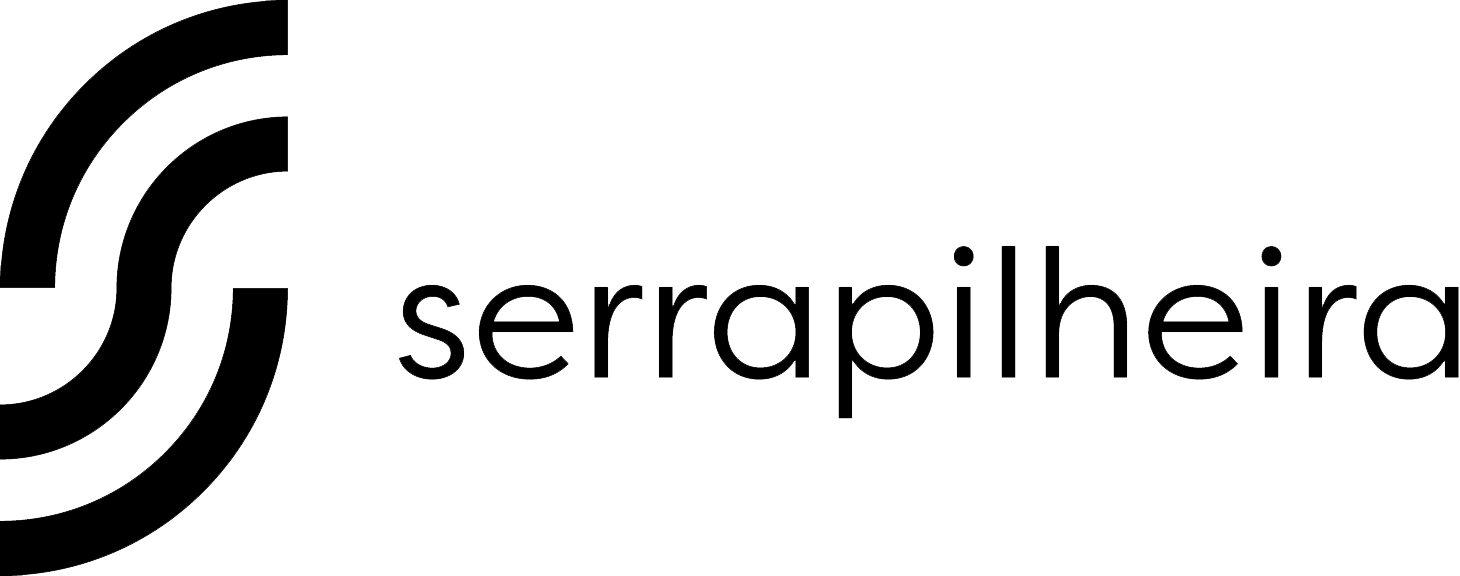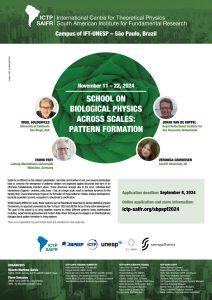School on Biological Physics across Scales: Pattern Formation


November 11 – 22, 2024
São Paulo, Brazil
ICTP-SAIFR/IFT-UNESP
Home
Systems as different as the cellular cytoskeleton, microbial communities in soil, and savanna landscapes have in common the emergence of patterns: random yet organized spatial structures that form in an otherwise translationally invariant space. These structures emerge due to the local, individual-level interactions of agents – proteins, cells, trees – that, on a larger scale, result in nonlinear dynamics for the density field. Crucial phenomena hinge on the formation of these patterns: mitosis, embryo development, bacterial population survival, ecosystem’s robustness to aridification.
While broadly different in scale, these systems can be theoretically described by similar statistical physics frameworks, an approach pioneered by Alan Turing in 1952 and still the focus of very active development. The goal of this school is to bring together experts on these different systems using mathematical modeling, experimental approaches and modern data-driven techniques to engage in an interdisciplinary dialogue about pattern formation in living systems.
There is no registration fee and limited funds are available for travel and local expenses.
Organizers:
-
- Ricardo Martinez-Garcia (CASUS / HZDR, Germany & ICTP-SAIFR/IFT-UNESP, Brazil)
- Pierre Ronceray (CINaM, Turing Centre for Living Systems, CNRS / Aix-Marseille Université, France)
List of Participants: Updated on November 21, 2024.
Survey: Here
Lectures
Lecturers:
- Nigel Goldenfeld (University of California San Diego, USA): Stochastic pattern formation in space and time: from the brain to the biosphere
- Johan van de Koppel (Royal Netherlands Institute for Sea Research, Netherlands): The Physics of spatial ecology
- Erwin Frey (Ludwig-Maximilians-Universität München, Germany): Self-organisation and pattern formation in living and synthetic cells
- Veronica Grieneisen (Cardiff University, UK): Integrating the different levels of pattern formation, from sub-cellular to cellular and finally, multi-cellular structures
- Ricardo Martinez-Garcia (CASUS / HZDR, Germany & ICTP-SAIFR/IFT-UNESP, Brazil): Spatiotemporal patterns in animal movement: from trajectories to interactions
- Pierre Ronceray (CINaM, Turing Centre for Living Systems, CNRS / Aix-Marseille Université, France): Towards data-driven biological physics: learning the dynamics of pattern-forming systems
Registration
Program
Posters
1. Renan A. L. Almeida (IF-UFRGS, Brazil): Critical percolation in phase ordering: evidence in liquid crystals.
2. Lucas Eduardo Bentivoglio (State University of Ponta Grossa, Brazil): Exploring Ionic Contributions to Neuronal Synchronization.
3. Ian Braga (UFMG, Brazil): On the path of evolution: death birth adaptive dynamics
4. Bruno Carvalho da Silva (Pgscx/Usp/Usp, Brazil): Application of Control Theory to the Stochastic Binary Model for Gene Expression Regulation.
5. Lucas de Souza (Federal University of Rio Grande do Norte, Brazil): Crowding effects in quorum-sensing particle systems.
6. Facundo Fainstein (Universidad de Buenos Aires, Argentina): Physical Constraints and Optimization in Avian Respiration
7. Guilherme Eduardo Freire Oliveira (Universidade Federal de Minas Gerais, Brazil): Pattern formation in the driven Widom-Rowlinson lattice gas.
8. Lara Domingos Hissa (IFGW – Unicamp, Brazil): Dynamics of Speciation in Multiple Environments.
9. Amahury Jafet Lopez Diaz (State University of New York at Binghamton, United States): Universal scaling behavior in thermal performance traits.
10. Diogo Leonai Marques de Souza (State University of Ponta Grossa, Brazil): Detection of rotating waves pattern in neuronal networks.
11. Vinicius Menuci Muccillo (Universidade Federal do Rio Grande Do Sul, Brazil): Optimal Lévy walks for cooperation in the Prisoner’s Dilemma game
12. Joaquin Morales (Universidad de Chile, Chile): Collective fractional Brownian motion driven by spatiotemporal light gradients.
13. Tiago Mourao (USP, Brazil): Tropical Forest Vegetation Dynamics
14. José Antônio Pellizzaro (UFRGS – Institute of Physics, Brazil): Metabolic Network Properties: Comprehensive Analysis Across Domains.
15. Yago Emanoel Ramos Silva (Federal University of Bahia, Brazil): Manual motor behavior and handedness: What your handedness can say about your upper limb motor strategy.
16. Renne Rodrigues Rosinelli Junior (Institute of Physics/ Univerty of Sao Paulo, Brazil): Computational simulation of microscopic models for dilute biaxial nematic liquid crystals
17. Matheus Rodrigues (Instituto de Biofísica Carlos Chagas Filho, Brazil): Modeling the effect of Calpain on dorsal-ventral axis patterning in Drosophila melanogaster.
18. Bibhut chandan Sahoo (University of Göttingen, Germany): Nonreciprocal Model B and the role of mobilities and nonreciprocal interfacial forces.
19. Pedro Masotti Moretti da Silveira (São Carlos Institute of Physics/ University of São Paulo, Brazil): Modeling ant activity cycles with delay differential equations.
20. Daniela Lioren Suarez (División Física Estadística Interdisciplinaria-Centro Atómico Bariloche, Argentina): Master equation and mean field for a three-species metapopulation model
21. Emanuel Fortes Teixeira (Instituto de Física da Universidade Federal do Rio grande do Sul (UFRGS), Brazil): Segregation in binary mixture with differential contraction among active rings
22. Victor Carlos Teixeira (PEM/COPPE/UFRJ, Brazil): The mechanics of microphase separation: A continuum description for the self assembly of symmetric diblock copolymer melts
23. Pedro H. L. O. Gurgel (Institute of Physics, University of São Paulo, Brazil): Investigating the interface between liquid-disordered and liquid-ordered domains in symmetric biomembranes
24. Benjamin Garcia de Figueiredo (Princeton University, USA): Dynamics of holes in dense monolayers of M. xanthus
25. Gabriel Piva (Universidade Federal de Lavras, Brazil): Influence of density-dependent diffusion on pattern formation in a refuge.
26. Aaron Robert Bourque (Princeton University, United States): 3D Characterization of Rippling in Dense Colonies of Myxococcus xanthus.
27. Jan Willeke (LMU Munich, Germany): Shaping Life: The Role of a Dynamic Geometry in Protein Pattern Formation
28. Antonia Winter (LMU Munich, LS Frey, Germany): Phase Separation on Deformable Membranes
Abstracts: here
Short Talks
1. Lara Koehler (MPI-PKS, Germany): From wave to chaos in the cytoplasm
2. Diana Sofia Valverde Mendez (Yale University, United States): Exploring single-cell heterogeneity in a developing biofilm.
3. Pablo de Castro (ICTP-SAIFR and IFT-UNESP, Brazil): Epidemic percolation among motility-induced clusters of active particles.
4. David Pinto-Ramos (CASUS-HZDR, Germany): Early collapse of vegetation cover induced by nonreciprocal interactions.
Abstracts: Here
Videos and Files
-
09:00 - Veronica Grieneisen (Cardiff University, UK):
Integrating the different levels of pattern formation, from sub-cellular to cellular and finally, multi-cellular structures
-
11:00 - Erwin Frey (Ludwig-Maximilians-Universität München, Germany):
Self-organisation and pattern formation in living and synthetic cells - Class 1
-
14:00 - Johan van de Koppel (Royal Netherlands Institute for Sea Research, Netherlands):
The Physics of spatial ecology - Class 1
-
16:00 - Nigel Goldenfeld (University of California San Diego, USA):
Stochastic pattern formation in space and time: from the brain to the biosphere - Class 1
-
09:00 - Erwin Frey (Ludwig-Maximilians-Universität München, Germany):
Self-organisation and pattern formation in living and synthetic cells - Class 2
-
11:00 - Johan van de Koppel (Royal Netherlands Institute for Sea Research, Netherlands):
The Physics of spatial ecology - Class 2
-
14:00 - Nigel Goldenfeld (University of California San Diego, USA):
Stochastic pattern formation in space and time: from the brain to the biosphere - Class 2
-
09:00 - Nigel Goldenfeld (University of California San Diego, USA):
Stochastic pattern formation in space and time: from the brain to the biosphere - Class 3
-
11:00 - Johan van de Koppel (Royal Netherlands Institute for Sea Research, Netherlands):
The Physics of spatial ecology - Class 3
- 14:00 - Nigel Goldenfeld (UCSD): The life and death of turbulence
-
16:00 - Erwin Frey (Ludwig-Maximilians-Universität München, Germany):
Self-organisation and pattern formation in living and synthetic cells - Class 3
-
14:00 - Nigel Goldenfeld (University of California San Diego, USA):
Stochastic pattern formation in space and time: from the brain to the biosphere - Class 4
-
11:00 - Erwin Frey (Ludwig-Maximilians-Universität München, Germany):
Self-organisation and pattern formation in living and synthetic cells - Class 4
-
15:00 - Nigel Goldenfeld (University of California San Diego, USA):
Stochastic pattern formation in space and time: from the brain to the biosphere - Class 5
-
16:00 - Johan van de Koppel (Royal Netherlands Institute for Sea Research, Netherlands):
The Physics of spatial ecology - Class 4
-
09:00 - Veronica Grieneisen (Cardiff University, UK):
Integrating the different levels of pattern formation, from sub-cellular to cellular and finally, multi-cellular structures - Class 2
-
11:00 - Ricardo Martinez-Garcia (CASUS / HZDR, Germany & ICTP-SAIFR/IFT-UNESP, Brazil):
Spatiotemporal patterns in animal movement: from trajectories to interactions
-
09:00 - Pierre Ronceray (CINaM, Turing Centre for Living Systems, CNRS / Aix-Marseille Université, France):
Towards data-driven biological physics: learning the dynamics of pattern-forming systems - Class 1
-
11:00 - Veronica Grieneisen (Cardiff University, UK):
Integrating the different levels of pattern formation, from sub-cellular to cellular and finally, multi-cellular structures - Class 3
-
14:00 - Verônica A. Grieneisen (Cardiff University):
From Cell Polarity to Tissue Polarity: how break of symmetries propagate in biological systems
-
09:00 - Veronica Grieneisen (Cardiff University, UK):
Integrating the different levels of pattern formation, from sub-cellular to cellular and finally, multi-cellular structures - Class 4
-
11:00 - Pierre Ronceray (CINaM, Turing Centre for Living Systems, CNRS / Aix-Marseille Université, France):
Towards data-driven biological physics: learning the dynamics of pattern-forming systems - Class 2
-
09:00 - Ricardo Martinez-Garcia (CASUS / HZDR, Germany & ICTP-SAIFR/IFT-UNESP, Brazil):
Spatiotemporal patterns in animal movement: from trajectories to interactions - Class 2
asdasdasd
Photos
Additional Information
Additional Information
Attention! Some participants in ICTP-SAIFR activities have received email from fake travel agencies asking for credit card information. All communication with participants will be made by ICTP-SAIFR staff using an e-mail “@ictp-saifr.org”. We will not send any mailings about accommodation that require a credit card number or any sort of deposit.
BOARDING PASS: All participants, whose travel has been provided or will be reimbursed by ICTP-SAIFR, should bring the boarding pass upon registration. The return boarding pass (PDF, if online check-in, scan or picture, if physical) should be sent to secretary@ictp-saifr.org by e-mail.
COVID-19: Brazilians and foreigners no longer have to present proof of vaccination before entering the country.
Visa information: Nationals from several countries in Latin America and Europe are exempt from tourist visa. Nationals from Australia, Canada and USA are exempt from tourist visa until April 10, 2025. Please check here which nationals need a tourist visa to enter Brazil.
Accommodation: Participants, whose accommodation will be provided by the institute, will stay at The Universe Flat. Hotel recommendations are available here.
How to reach the Institute: The first week of the school will be held at ICTP South American Institute, located at IFT-UNESP, which is across the street from a major bus and subway terminal (Terminal Barra Funda). The address which is closer to the entrance of the IFT-UNESP building is R. Jornalista Aloysio Biondi, 120 – Barra Funda, São Paulo. The easiest way to reach us is by subway or bus, please find instructions here.
Poster presentation: Participants who are presenting a poster MUST BRING A PRINTED BANNER . The banner size should be at most 1 m (width) x 1,5 m (length). We do not accept A4 or A3 paper.

